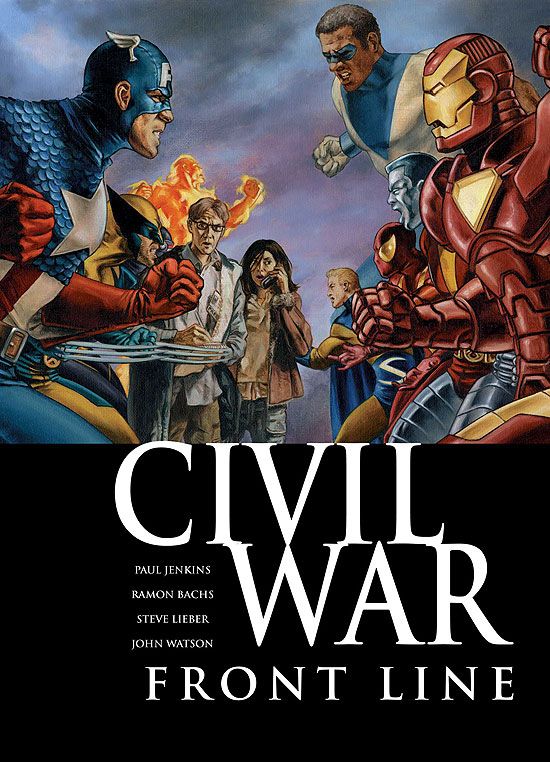As I wrote during my bit on Civil War #1, I think it is rare to see a comic that was more thrown under the bus than its own company than Civil War. To wit, almost the entire plot of Civil War #1 was given away by interviews and solicits, and then, for #2, the New York Post had the big reveal of #2 before most readers picked up a copy. Another example of throwing the story under the bus, I think, is the treatment of Civil War: Front Line. There basically seems to be no coordination between Civil War and Civil War: Frontline from a thematic stance, as for Civil War, Marvel claims that they are not "choosing sides" with the comic, and for the most part, I think Mark Millar has held true to this claim. However, Paul Jenkins does not go by that perspective at ALL, which I do not blame him for, to be honest. It is the responsibility of editorial to say, "Hey, Paul, you have to make this thing seem even, okay?" If they do NOT tell him this, then how can I blame a guy for going by his personal views? I posit that I cannot. Therefore, while the contextual presentment of the comic is weak, I think Civil War: Front Line was a decent comic undone just by some silly hyperbolic moments.
Civil War: Front Line is split into three stories, all of which are written by Jenkins. The lead story is drawn by Ramon Bachs, who is doing probably the finest work of his career as of late (inker John Lucas deserves some credit, I suppose), the second story is by the great Steve Leiber and the last story is by Kei Kobayashi.
The first story has Jenkins plainly present the Registration Act as liberal vs. conservative, "good" vs. "bad" (at least from the perspective of the book's protagonist, Sally Floyd). Like I said before, this really corrupts the stance that Marvel claims they are presenting with Civil War, but that's not Paul Jenkins' responsibility. His is to just tell a good story. And, save some silly (easily avoidable) moments, I think he succeeds. Let's list the silly moments, shall we?
1. The New Warriors cameraman being a veteran news reporter was a GREAT idea. However, the cameraman referring to following a bunch of obscure superheroes around on a reality show being a "big break"? Lame. It should have been something like, "He finally got the big bucks," or something like that. Silly and avoidable, but the basic idea (News reporters gather for the funeral of their friend) was good.
2. "This was put into motion the day some angry extremists decided to fly a couple of planes into some tall building in Manhattan." Lordy, that was silly.
3. "Jonah Jameson - publisher of the Right-Wing New York Toilet-Rag known as the Daily Bugle" - Lame!!
There was a few other lines like that peppered through the story. Just silly, unneccesary comments by Jenkins. Which is too bad, because the interview between Spidey and Sally Floyd was done quite well, with a GREAT kicker. And the Iron Man press conference was fine.
The second story, with Speedball surviving, was okay. Although I'd like to see what the heck they are going to charge Speedball with. He wasn't even FIGHTING Nitro when he exploded, so what is he going to be charged with?
The third story, though, was just insane. It was comparing Spidey's plight to Japanese-Americans being interned during World War Two. I would like to think that, now, looking back, Jenkins realizes how silly/borderline offensive this story was. I would LIKE to think that, but who knows? And heck, forget Jenkins, who the hell APPROVED that story? Not only did the story get approved, but it looks like there was some ass-covering thrown on at the end with a text opening that says, "Hey, the internment camps weren't THAT bad." What the heck was the point of THAT? But yeah, that was just waaaay too silly. "Giving up my identity is sooo comparable to going into an internment camp." Man, that was dumb. It was hyperbolic, it was silly, it was just a bad, bad idea. Nice art, though (nice art all throughout the book).
So yeah, some good writing by Jenkins and some very nice art is drowned out by silly rhetoric. And, from Marvel's perspective, they really ought not to have let Jenkins write this book if they want to claim that they aren't choosing sides.
Not Recommended.


